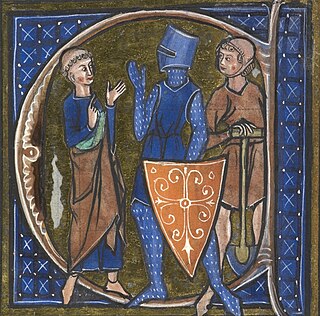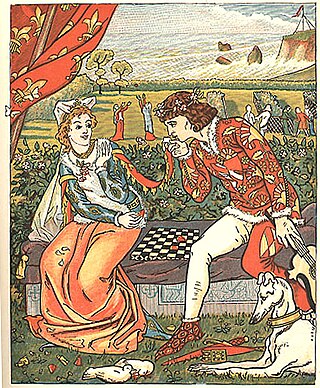
The Canterbury Tales is a collection of twenty-four stories that runs to over 17,000 lines written in Middle English by Geoffrey Chaucer between 1387 and 1400. It is widely regarded as Chaucer's magnum opus. The tales are presented as part of a story-telling contest by a group of pilgrims as they travel together from London to Canterbury to visit the shrine of Saint Thomas Becket at Canterbury Cathedral. The prize for this contest is a free meal at the Tabard Inn at Southwark on their return.

The bourgeoisie is a class of business owners and merchants which emerged in the Late Middle Ages, originally as a "middle class" between peasantry and aristocracy. They are traditionally contrasted with the proletariat by their wealth, political power, and education, as well as their access to and control of cultural, social and financial capital.

Serfdom was the status of many peasants under feudalism, specifically relating to manorialism, and similar systems. It was a condition of debt bondage and indentured servitude with similarities to and differences from slavery. It developed during the Late Antiquity and Early Middle Ages in Europe and lasted in some countries until the mid-19th century.

A gentleman is any man of good and courteous conduct. Originally, gentleman was the lowest rank of the landed gentry of England, ranking below an esquire and above a yeoman; by definition, the rank of gentleman comprised the younger sons of the younger sons of peers, and the younger sons of a baronet, a knight, and an esquire, in perpetual succession. As such, the connotation of the term gentleman captures the common denominator of gentility ; a right shared by the peerage and the gentry, the constituent classes of the British nobility.

The estates of the realm, or three estates, were the broad orders of social hierarchy used in Christendom from the Middle Ages to early modern Europe. Different systems for dividing society members into estates developed and evolved over time.

"The Miller's Tale" is the second of Geoffrey Chaucer's Canterbury Tales (1380s–1390s), told by the drunken miller Robin to "quite" "The Knight's Tale". The Miller's Prologue is the first "quite" that occurs in the tales.

"The Wife of Bath's Tale" is among the best-known of Geoffrey Chaucer's Canterbury Tales. It provides insight into the role of women in the Late Middle Ages and was probably of interest to Chaucer himself, for the character is one of his most developed ones, with her Prologue twice as long as her Tale. He also goes so far as to describe two sets of clothing for her in his General Prologue. She holds her own among the bickering pilgrims, and evidence in the manuscripts suggests that although she was first assigned a different, plainer tale—perhaps the one told by the Shipman—she received her present tale as her significance increased. She calls herself both Alyson and Alys in the prologue, but to confuse matters these are also the names of her 'gossib', whom she mentions several times, as well as many female characters throughout The Canterbury Tales.

"The Franklin's Tale" is one of The Canterbury Tales by Geoffrey Chaucer. It focuses on issues of providence, truth, generosity and gentillesse in human relationships.
The Hengwrt Chaucer manuscript is an early-15th-century manuscript of the Canterbury Tales, held in the National Library of Wales, in Aberystwyth. It is an important source for Chaucer's text, and was possibly written by someone with access to an original authorial holograph, now lost.

The landed gentry, or the gentry, is a largely historical British social class of landowners who could live entirely from rental income, or at least had a country estate. While distinct from, and socially below, the British peerage, their economic base in land was often similar, and some of the landed gentry were wealthier than some peers. Many gentry were close relatives of peers, and it was not uncommon for gentry to marry into peerage. It is the British element of the wider European class of gentry. With or without noble title, owning rural land estates often brought with it the legal rights of lord of the manor, and the less formal name or title of squire, in Scotland laird.

The General Prologue is the first part of The Canterbury Tales by Geoffrey Chaucer. It introduces the frame story, in which a group of pilgrims travelling to the shrine of Thomas Becket in Canterbury agree to take part in a storytelling competition, and describes the pilgrims themselves. The Prologue is arguably the most familiar section of The Canterbury Tales, depicting traffic between places, languages and cultures as well as introducing and describing the pilgrims who will narrate the tales.

In Anglo-Saxon England, the reeve was a senior official with local responsibilities under the Crown, such as the chief magistrate of a town or district. After the Norman conquest, it was an office held by a man of lower rank, appointed as manager of a manor and overseer of the peasants. In this later role, historian H. R. Loyn observes, "he is the earliest English specialist in estate management."
A laird is the owner of a large, long-established Scottish estate. In the traditional Scottish order of precedence, a laird ranked below a baron and above a gentleman. This rank was held only by those lairds holding official recognition in a territorial designation by the Lord Lyon King of Arms. They are usually styled [name] [surname] of [lairdship]. However, since "laird" is a courtesy title, it has no formal status in law.

A villein is a class of serf tied to the land under the feudal system. As part of the contract with the lord of the manor, they were expected to spend some of their time working on the lord's fields in return for land. Villeins existed under a number of legal restrictions that differentiated them from freemen, and could not leave without his lord's permission. Generally, villeins held their status not by birth but by the land they held, and it was also possible for them to gain manumission from their lords. The villeinage system largely died out in England in 1500, with some forms of villeinage being in use in France until 1789.
The history of English land law can be traced back to Roman times. Throughout the Early Middle Ages, where England came under rule of post-Roman chieftains and Saxon monarchs, land was the dominant source of personal wealth. English land law transformed further from the Saxon days, particularly during the post-Norman Invasion feudal encastellation and the Industrial Revolution. As the political power of the landed aristocracy diminished and modern legislation increasingly made land a social form of wealth, subject to extensive social regulation such as for housing, national parks, and agriculture.

Gentry are "well-born, genteel and well-bred people" of high social class, especially in the past. Gentry, in its widest connotation, refers to people of good social position connected to landed estates, upper levels of the clergy, or "gentle" families of long descent who in some cases never obtained the official right to bear a coat of arms. The gentry largely consisted of landowners who could live entirely from rental income or at least had a country estate; some were gentleman farmers. In the United Kingdom, the term gentry refers to the landed gentry: the majority of the land-owning social class who typically had a coat of arms but did not have a peerage. The adjective "patrician" describes in comparison other analogous traditional social elite strata based in cities, such as the free cities of Italy and the free imperial cities of Germany, Switzerland, and the Hanseatic League.
The Prologue and Tale of Beryn are spurious fifteenth century additions to Geoffrey Chaucer's Canterbury Tales. They are both written in Middle English.
Serfdom has a long history that dates to ancient times.

The Squire is a fictional character in the framing narrative of Geoffrey Chaucer's Canterbury Tales. He is squire to the Knight and is the narrator of The Squire's Tale or Cambuscan. The Squire is one of the secular pilgrims, of the military group. The Knight and the Squire are the pilgrims with the highest social status. However his tale, interrupted as it is, is paired with that of the Franklin. The Squire is a candidate for the interrupter of The Host in the epilogue of the Man of Law's Tale.












